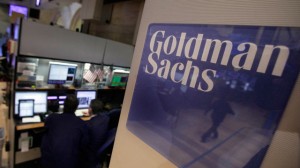
Traders work in the Goldman Sachs booth on the floor of the New York Stock Exchange. March 2012. (AP Photo/Richard Drew)
In September, Jake Bernstein broke the story of Carmen Segarra’s revelations about the inner workings of the New York Fed for ProPublica and the public radio show, “This American Life.” Segarra had worked for the Fed as a special examiner to investigate Goldman Sachs, one of the most controversial of Wall Street’s “too-big-to-fail” financial institutions. She was fired after only seven months on the job — and lost a lawsuit in which she claimed that her dismissal was in retaliation for refusing to back down from a finding that Goldman didn’t have an adequate policy in place to prevent conflicts of interest.
But while her suit was unsuccessful, it revealed that Segarra had secretly recorded 46 hours of conversations with her supervisors and fellow inspectors. And the audio revealed a culture of deference to the banks the Fed was supposed to be supervising, and a clear pattern of “regulatory capture” — a type of corruption where those who are tasked with protecting the public interest instead work to advance private commercial interests.
On Friday, New York Fed President William Dudley appeared before the Senate Banking Committee, and was, as the Wall Street Journal put it, “lambasted” by a number of senators for his responses to questions about the Fed’s independence. Sen. Jack Reed (D-RI), told Dudley: “Good fences make good neighbors. There is the perception that are no fences between the [New York] Fed and the banks it regulates.”
As the Huffington Post noted, Dudley also conceded for the first time that the NY Fed views big Wall Street firms as “too-big-to-jail,” a charge long denied by officials.
But it was his statement that the Fed’s primary function as banking supervisors isn’t to act “like a cop on the beat” that really raised eyebrows. Dudley continued: “It’s more like a fire warden; make sure that the institution is well run so that, you know, it’s not going to catch on fire and burn down. And managed in a way that if the institution is stressed that it doesn’t collapse and threaten the rest of the financial system.”
As Rob Blackwell wrote for The American Banker, “Dudley reached for a metaphor with probably more meaning than he intended, and one with potentially disturbing implications.”
The job of a cop on the beat is pretty straightforward. They are there to keep the peace, look for wrongdoing, and punish offenders when necessary.
But the role of a fire marshal is very different. A fire marshal’s job is to protect a building and its inhabitants — and save them at all costs, even from the consequences of their own errors. If a man lights his house on fire, the marshal’s job isn’t to punish him or even make sure it doesn’t happen again. The fire marshal’s role is instead to deal with the fire, rescue everyone, and put it out before it can spread.
That sounds noble, and in real life it is. But when discussing bank regulation, it raises the uncomfortable specter of bailouts and other supervisory intervention taken not to prevent problems, but instead to contain them.
Last Thursday, after another critical hearing on Capitol Hill, the Fed’s Inspector General’s office announced that it was undertaking a a sweeping review of the agency’s supervisory capacity. As Gretchen Morgenson wrote for The New York Times, the move “looks an awful lot like damage control.”
A big part of the damage came during an exchange between Sen. Elizabeth Warren and William Dudley. Watch the video:



